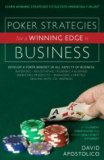
Lessons from the Pro Poker Tour

Poker Strategies for a Winning Edge in Business
Calling to Exert Pressure
 David Apostolico is the author of 'Machiavellian Poker Strategy', and 'Tournament Poker and The Art of War,' and his latest title 'Poker Strategies for a Winning Edge in Business.' David's website is www.holdemradio.com/blog/ doing so, you put maximum pressure on your opponent. We tend to associate calling with weakness. We even have a term for the weakest of all opponents – the ‘Calling Station.” Of course, there are plenty of situations where we know calling is an acceptable move such as calling with a drawing hand when you are getting sufficient pot odds to do so. Yet, we never hear much discussion about calling to exert pressure on an opponent. In unique situations, however, I think such a move can be accomplished.
David Apostolico is the author of 'Machiavellian Poker Strategy', and 'Tournament Poker and The Art of War,' and his latest title 'Poker Strategies for a Winning Edge in Business.' David's website is www.holdemradio.com/blog/ doing so, you put maximum pressure on your opponent. We tend to associate calling with weakness. We even have a term for the weakest of all opponents – the ‘Calling Station.” Of course, there are plenty of situations where we know calling is an acceptable move such as calling with a drawing hand when you are getting sufficient pot odds to do so. Yet, we never hear much discussion about calling to exert pressure on an opponent. In unique situations, however, I think such a move can be accomplished.
Sandy Meisner was one of the legendary acting teachers of the 20th century. In his book Sandy Meisner on Action, Mr. Meisner discusses a technique he used in the classroom. This particular lesson involved two actors. One of the actors would imitate the other. For instance, the first actor may say “I dropped some coins.” The subsequent conversation would go something like this:
This exercise was meant to be liberating for the actor doing the imitating. By imitating, the actor was in effect taking the heat off of himself. As Mr. Meisner explained “to take the heat off yourself … to transfer the point of concentration outside of yourself is a big battle won.”
Let’s think about that in the context of poker. Any time you can transfer the heat off of yourself and onto your opponent, I would say that you have won a big battle. In no limit play in poker, we have been trained repeatedly to think in terms of betting and raising to exert pressure. We think of calling in defensive terms unless we are trying to trap an opponent. Before I offer an example of calling to exert pressure, think for a moment about how you feel when you make a big pre-flop bet, get one caller and then totally miss the flop. You follow through with another big post-flop bet and again get called. At that point, do you feel that the pressure is on you or your opponent?
In a recent tournament I was playing, we were down to the final six players when a very aggressive player raised under the gun. I called from the button with QdJd. The flop came 10d6h2d, giving me two over cards and a flush draw. Just as I expected, my aggressive opponent made a big follow up bet. I thought about raising, but then quickly settled on just calling. I was quite sure that he had missed the flop but I honestly thought that my calling would exert more pressure on this opponent. If I raised, I faced a very real possibility of a re-raise. This opponent has a substantial chip lead on me and he wasn’t afraid to use his chips. With a player like this who uses chips as a weapon, a raise on my part would only offer him the chance to go for more ammo. He was also more likely to give me credit for a hand if I just smooth called. So that’s what I did.
The turn brought the 4c and no apparent help to either of us. Again, my opponent made a substantial bet but not as big as I thought he should have. I sensed he was weakening but again I just called in my belief that would put maximum pressure on him. The river brought the 8s. At this point, I watched my opponent play with some chips before finally checking. I immediately moved all-in. With exasperation, he flipped his A-J into the muck and conceded the hand.
There is no question in my mind that by calling, I put more pressure on my opponent than I could have by raising. If I had raised the flop, I am fairly certain he would have re-raised big and forced me off the hand. By just calling, I took that weapon away from him and left him feeling less in control than he would have liked.
Now, against many opponents I would have raised on the flop to exert pressure. In this particular situation against this particular opponent, though, by mirroring my opponent’s moves I was able to completely transfer the point of concentration from myself onto him. Once I won that battle, winning the pot was easy.

